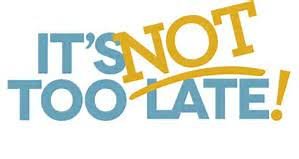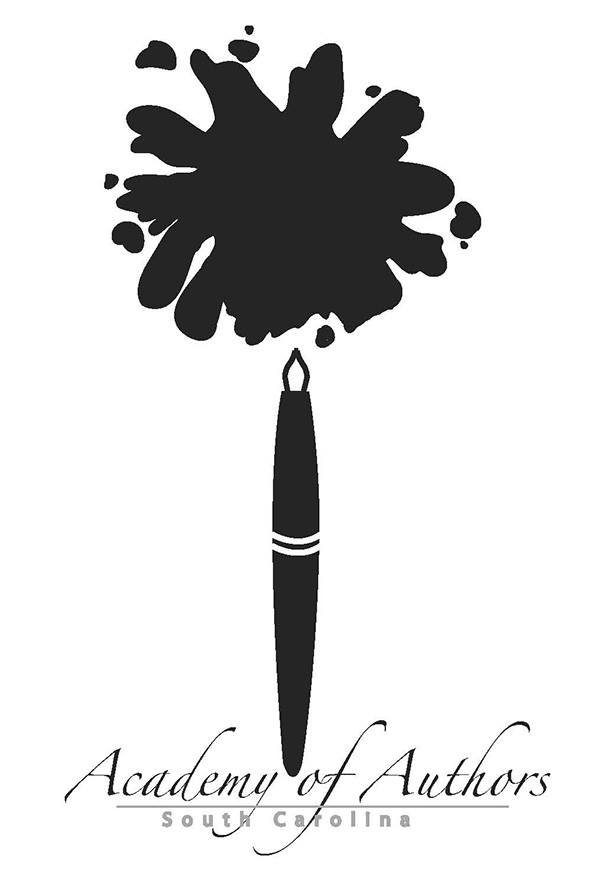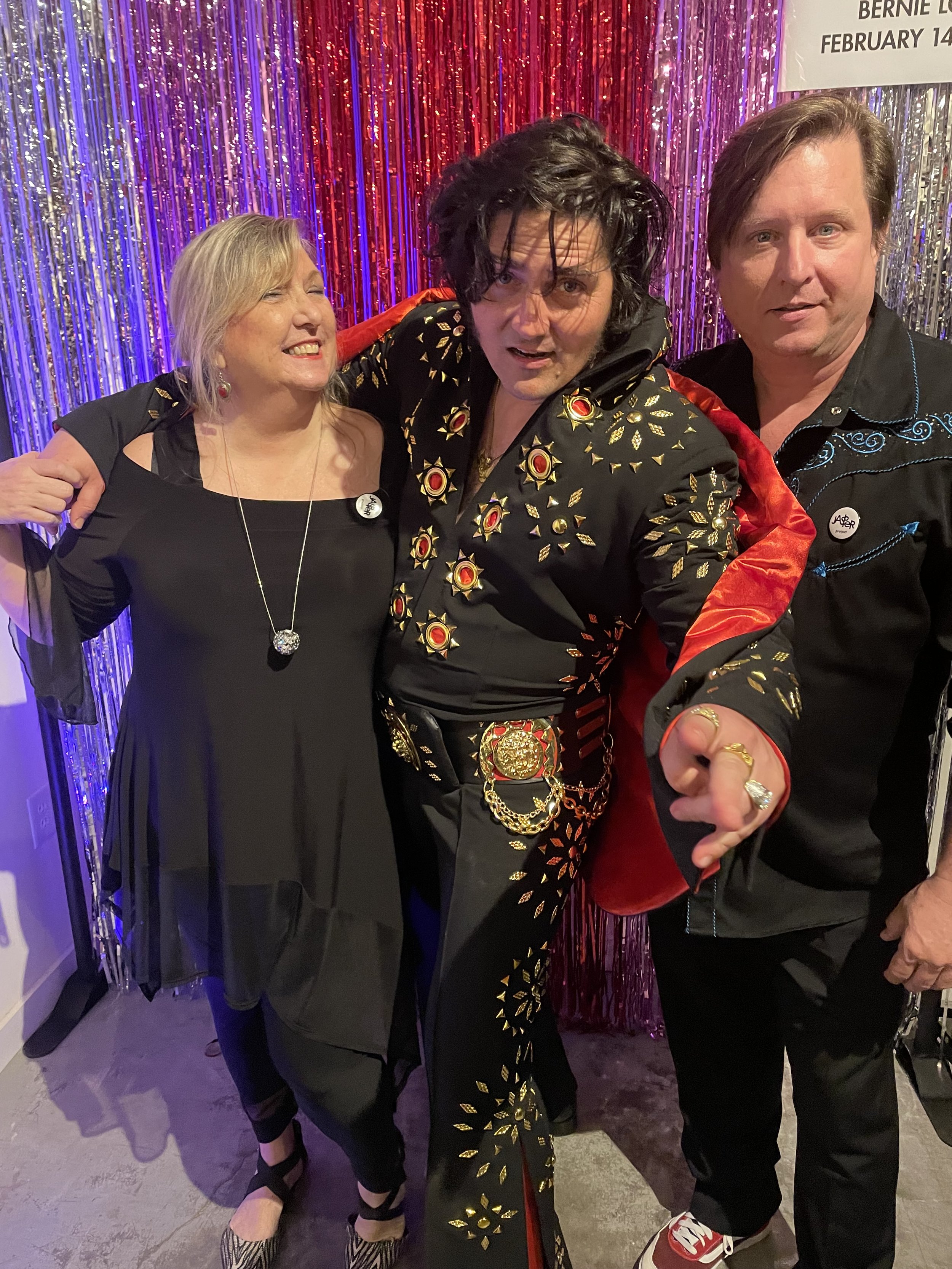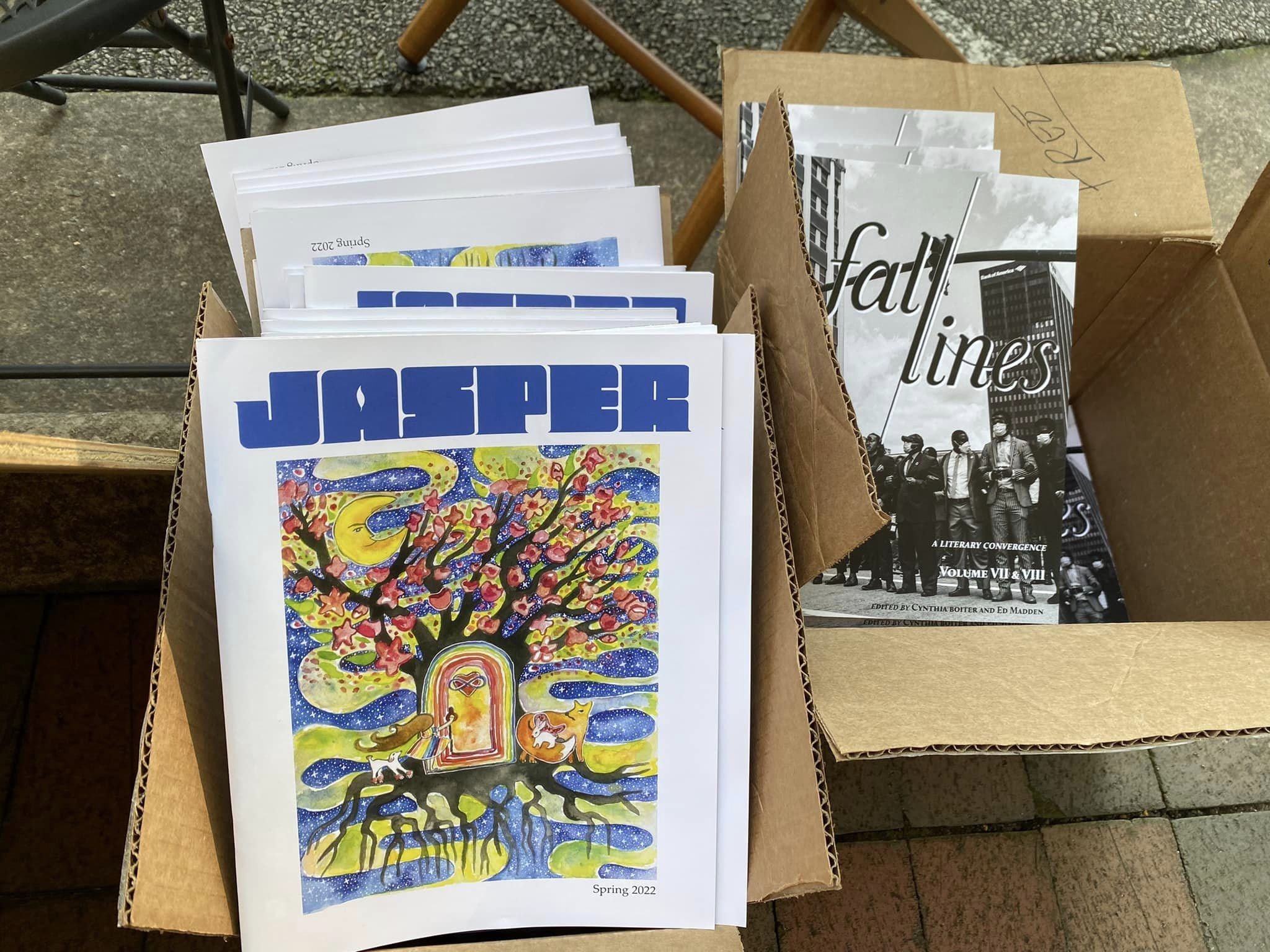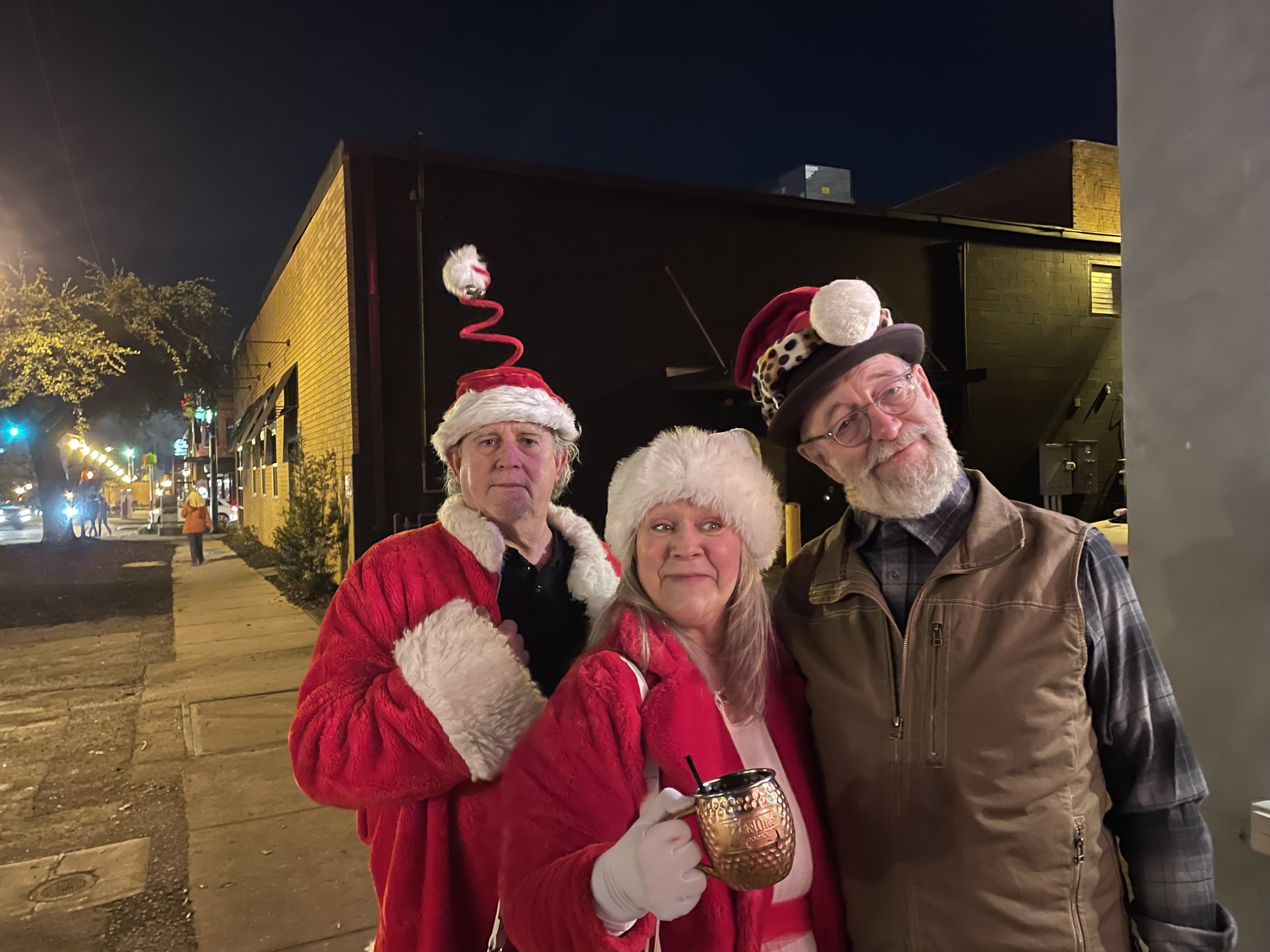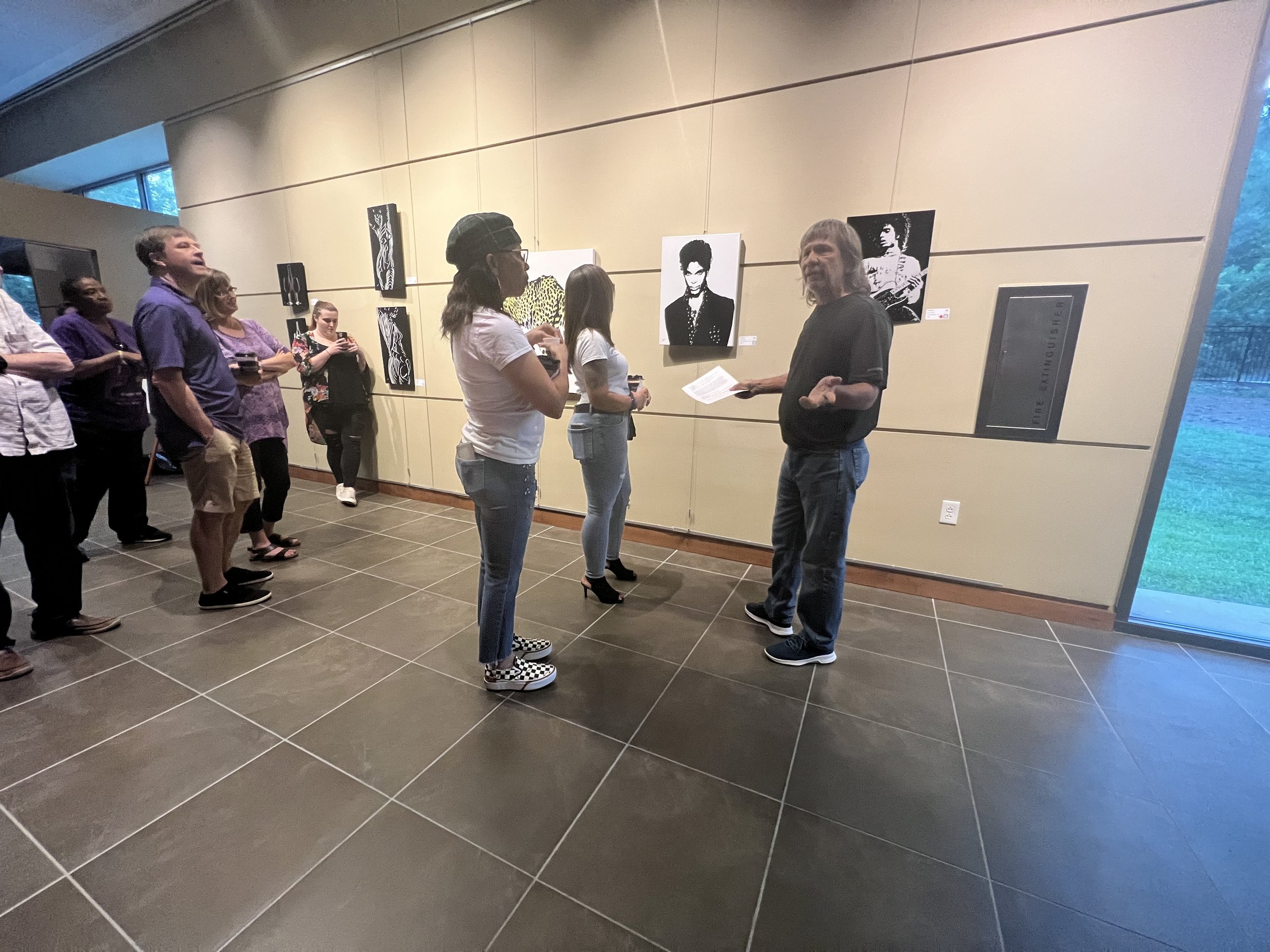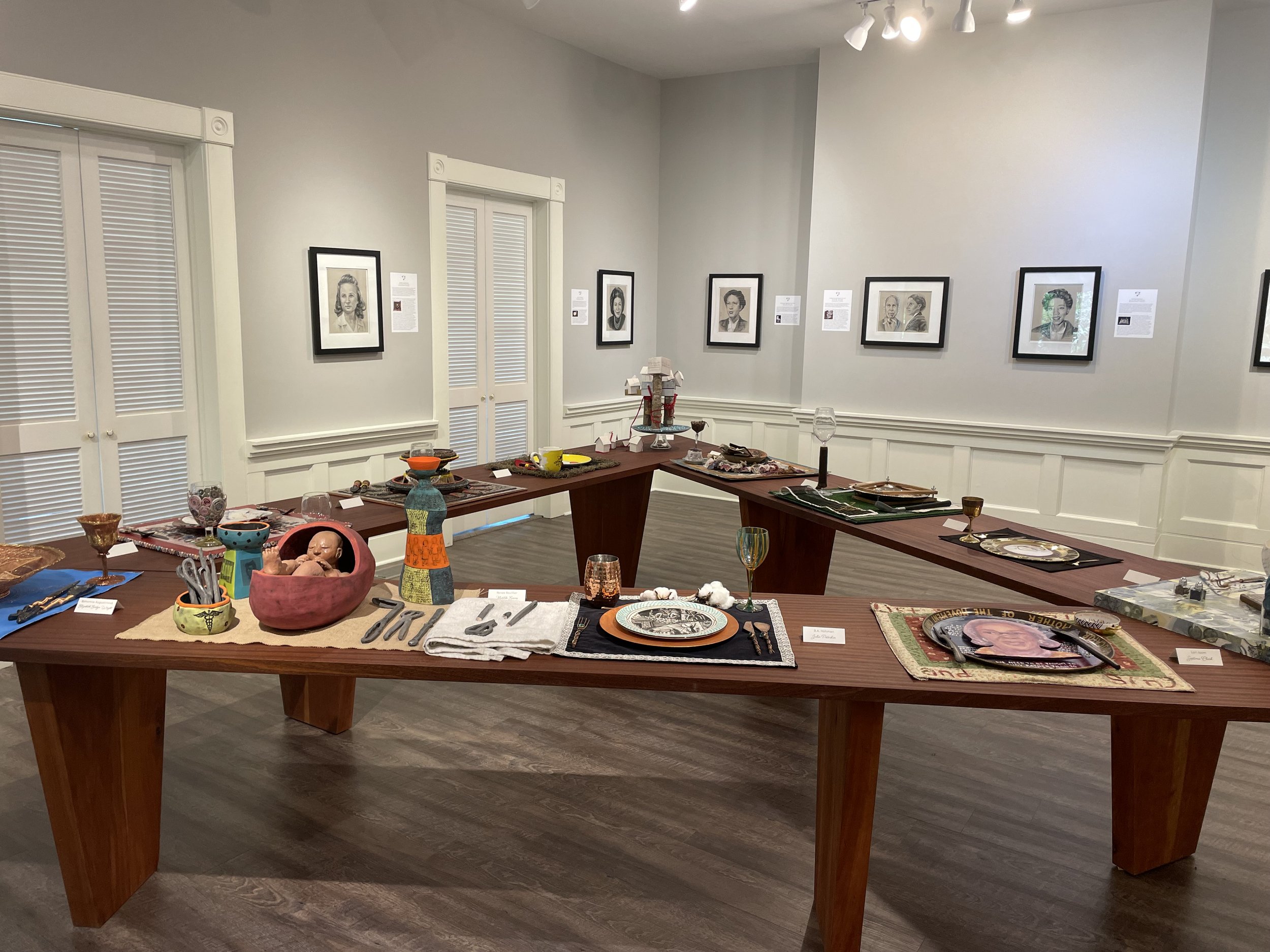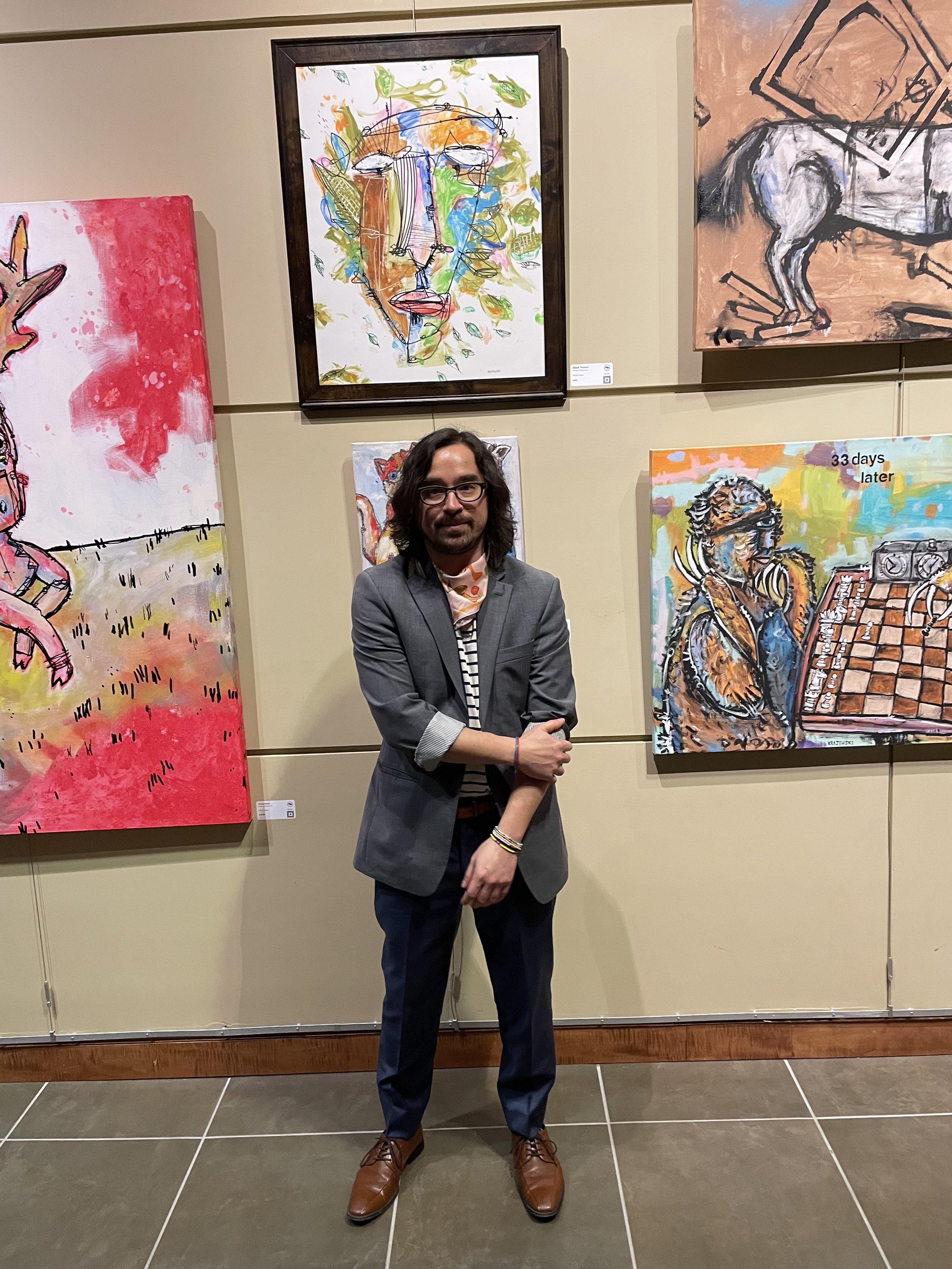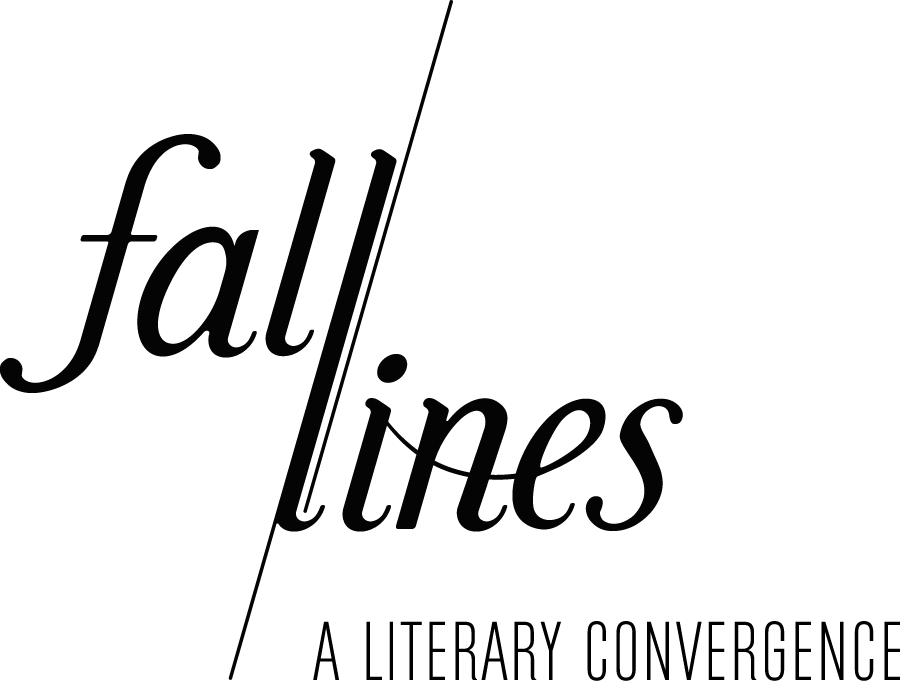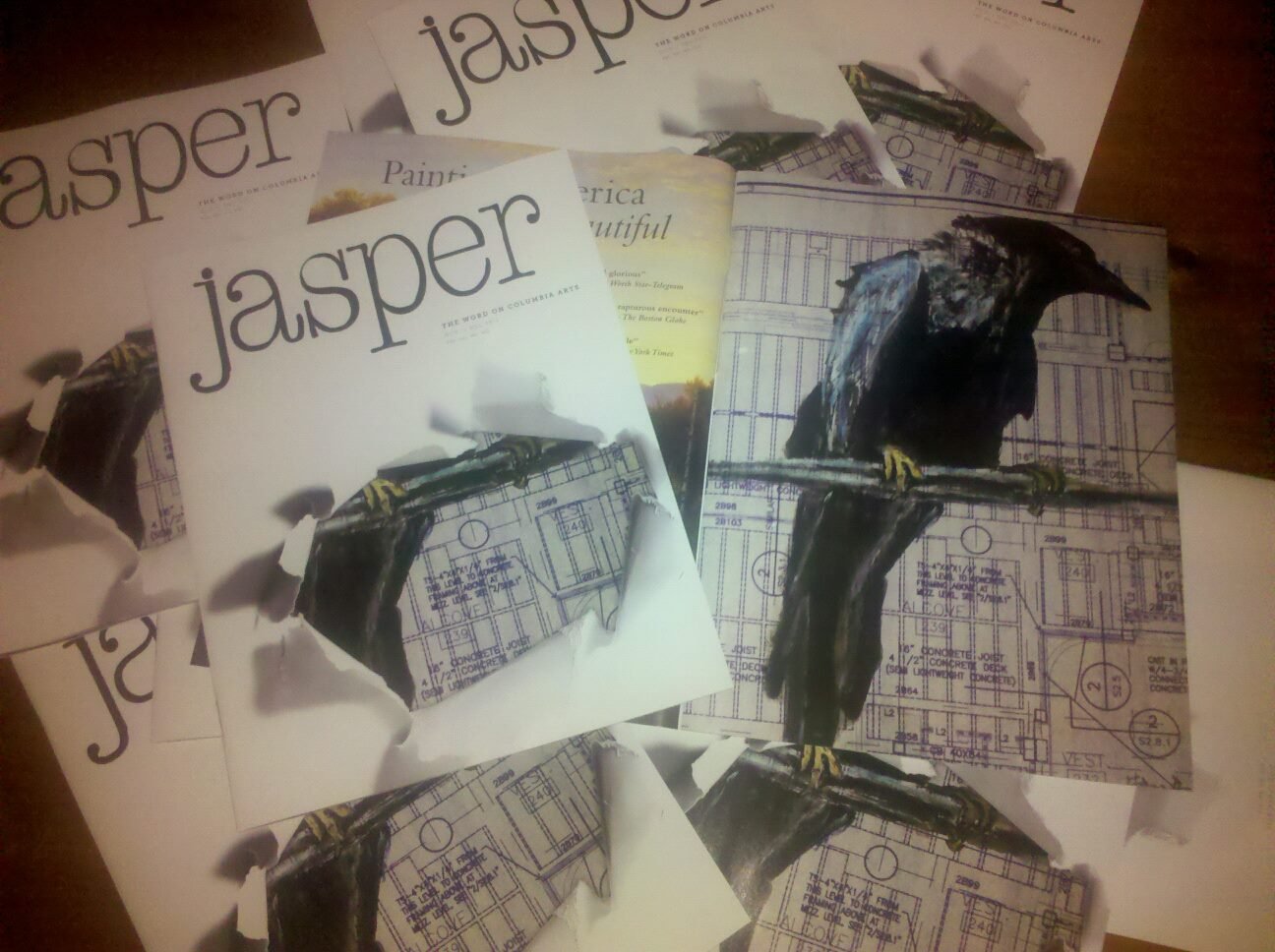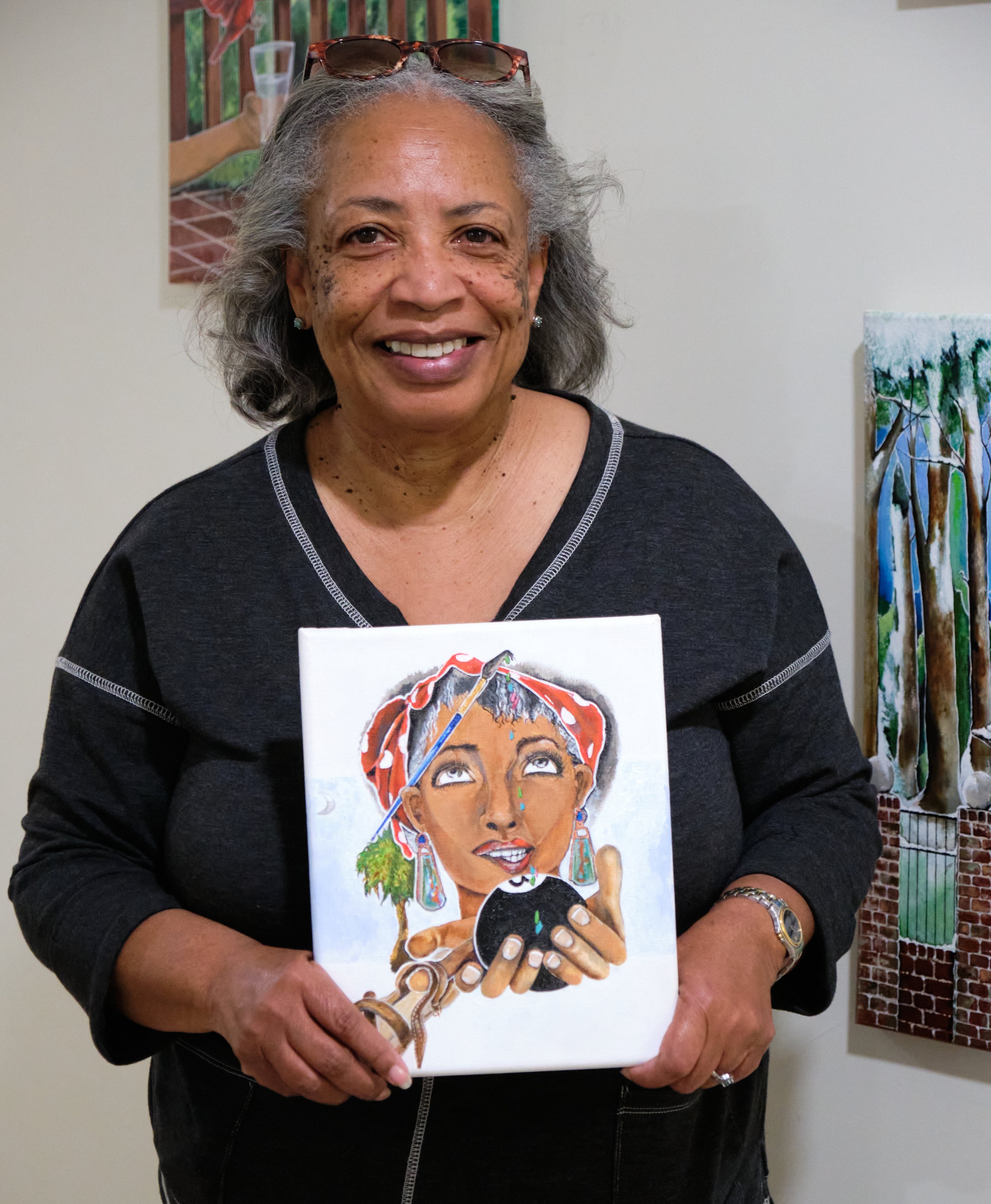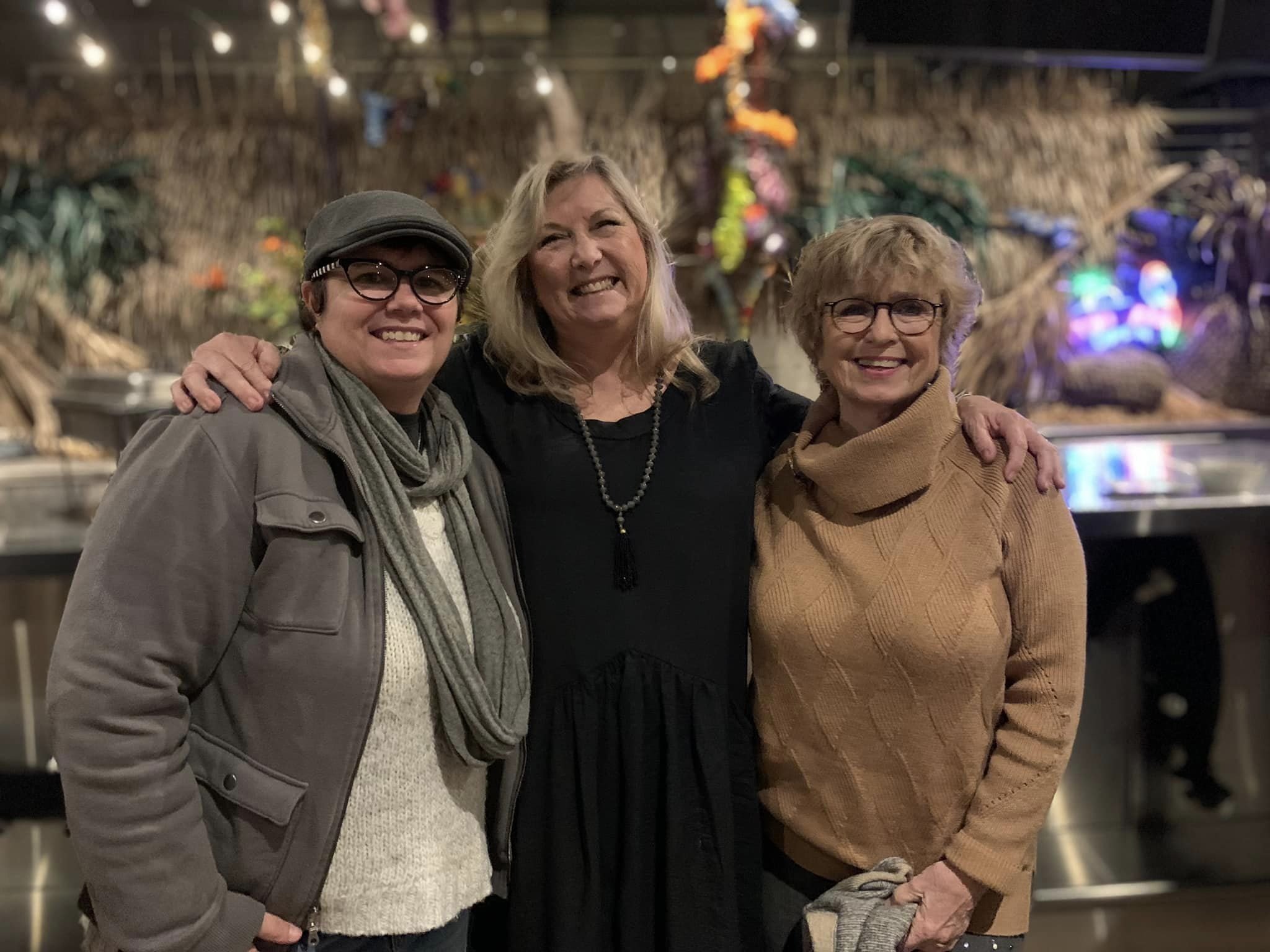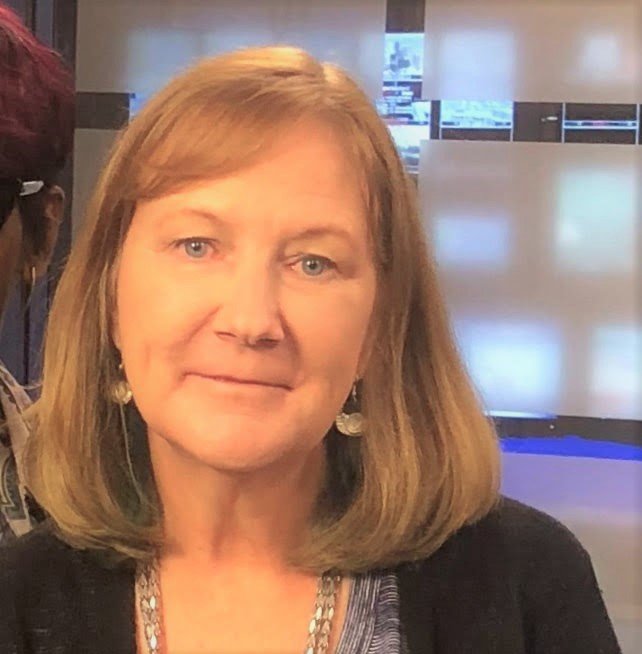Fall Lines Volume X Cover Artist is Lindsay Radford Wiggins!
The Jasper Project is excited to reveal the cover for the tenth volume of Fall Lines - a literary convergence by The Art of Symphony artist Lindsay Radford Wiggins!
Lindsay Radford Wiggins graduated from Columbia College with a Studio Art degree in 2011. Originally from Montgomery, Alabama she now considers Columbia home after living here 23 years. She works full-time in histology and paints as much as she can when she is not working in the lab. She is a multi-media artist and photographer, and watercolor on paper has been her most recent obsession.
Wiggins’ body of work is typically inspired by meditation, walks in nature, and her beloved poodle, Ziggy. Her paintings embody a spiritual authenticity with her own signature whimsical flair. Influenced by German expressionism and women surrealists, her work speaks to the artist’s personal experiences, connections, and emotions, making each piece a diary-like entry of celestial swirls. The playful imagery and repetition of symbols invites the viewer to call upon their own life experience and create their own personal dialog. Wiggins’ work has been exhibited at numerous SC venues, including 701 Whaley, Koger Center of the Arts, and Trustus Theater. Her paintings are represented in many private collections, and she was featured on the cover of Jasper Magazine’s spring 2022 issue and on the cover of Kristine Hartvigsen’s recently released book of poetry, The Soulmate Poems (Finishing Line Press 2024).
The cover art for Fall Lines volume X was created for the Jasper Project’s The Art of Symphony project (April 2024), a collaboration with the South Carolina Philharmonic in which 14 visual artists from Columbia, SC created paintings inspired by the music of Tanaka, Tchaikovsky, and Shostakovich.
Congratulations to the Accepted Contributors to Fall Lines - a literary convergence, volume X
On behalf of the Jasper Project, we’re delighted to announce that the following literary art was selected for inclusion in Fall Lines Volume X, releasing in spring 2024. These contributions were selected from several hundred poetry and prose submissions, and we couldn’t be happier to include them in this milestone tenth volume of Fall Lines – a literary convergence.
In early 2024 we will announce via the same website where and when we will hold our annual Fall Lines reading and awards ceremony, as well as the winners of the Saluda River Prize for Poetry, the Broad River Prize for Prose, and the Combahee River Prize in Poetry and Prose for a South Carolina Writer of Color.
Until then, congratulations and thank you for sharing your talents with the Jasper Project and allowing us to share them with the world.
Paul Toliver Brown – Digging to China
Allen Stevenson -- Shep’s Story
Bryan Gentry – Some People Never Change
Ruth Nicholson – The Red and Blue Box
Suzanne Kamata – Community Building
Evelyn Berry – Home Party
Randy Spencer – Next Day Now
Liz Newell – Red Hill Fans
Debra Daniel – Eve Purchases an Apple Watch
Shannon Ivey – As I Went Down to the River to Pray
Eric Morris – Straight Down Shadows
Lonetta Thompson – The Differences
Napoleon Wells – The Court of Thieves
Tshaka Campbell – Pews
Ann-Chadwell Humphries – Urban Eagle
Jacquelyn Markham – The persistence of limited memory & Storage
Brian Slusher – *Improv 101 & What else for you darlin?
Worthy Evans – *Blue Song for Bringing the Body Home & Blues Song for Never Having What I am Relative to Everybody Else
Rhy Robidoux –*Whereas
Nadine Ellsworth-Moran – *Nasturtium grows lush
Susan Craig – Migration & Treating our mother's last living friend
Heather Emerson – Divorce & Ceilings
Joshua Dunn – Clearing House
Candice Kelsey – Chainsaws & Renewable Energy
Terri McCord – Following a Blast
Randy Spencer – *Reading Ann’s Poem & In Passing
Debra Daniel – *Studies in Reproduction
Loli Munoz – Liminal
Frances Pearce – Strawberries
Ann Herlong-Bodman – One More
Jo Angela Edwins – A Neighbor Calls a Cool June Evening a Miracle
Kristine Hartvigsen – What I’ll pack for the apocalypse & Inagaddadavida
Al Black –*Meditations on the Lawh-i-Aqdas & Midnight Call to Prayer
Tim Conroy – Journeys
Jessica Hylton – Space
Amanda Warren – Divination Road
Danielle Ann Verwers—How was your day
Libby Bernardin – Ode to the Santee Delta & Ramble of thought as I read an article in the New York Times
Ellen Blickman --The Mystery of Pomegranates
Allison Cooke – Whippoorwill Elegy
Julie Ann Cook -- Into blue
Bryan Gentry – Hail, Fuse
Kelley Lannigan – Aubade
Gilbert Allen -- T**** IS PRESIDENT
Jane Zenger – Choices
Anna Ialacci – Ruined
Nicholas Drake – The Space Beside Her
Graham Duncan -- Exceptionalism
(* indicates finalists for the Saluda River Prize for Poetry)
Fall Lines - a literary convergence is made possible through a partnership between the Jasper Project, One Columbia for Arts and Culture, Richland Library, and the Friends of Richland Library.
Deadline for Fall Lines Extended to August 14th! Whew!
It’s not too late to submit your poetry and prose to the 2023 Fall Lines - a literary convergence journal and competition.
Because at Jasper, we know how it feels to juggle art and life, we’re extending the deadline for submissions to 2023 Fall Lines volume X until midnight Monday, August 14th.
This gives you two weekends to create a poem or some flash fiction, or to finish and polish that short story you’ve been building in your mind, if not on the screen or paper.
Don’t forget that this year we’re offering Three Prizes!
The Saluda River Prize for Poetry and the Broad River Prize for Prose, sponsored by the Friends of the Richland Library, as well as the Combahee River Prize for South Carolina writer of color in either poetry or prose, sponsored by the SC Academy of Authors.
So relax. You have plenty of time to burnish your words and send them on to Jasper.
We can’t wait to read what you’ve written!
SC Academy of Authors Sponsors Jasper's Combahee Prize for a SC Writer of Color in this year's Fall Lines
The Jasper Project is delighted to announce that the South Carolina Academy of Authors will be the sponsor of the 2023 Combahee Prize for a SC writer of color in this year’s Fall Lines – a literary convergence journal.
Founded in 1986, the South Carolina Academy of Authors (SCAA) is a nonprofit organization which recognizes distinguished South Carolina writers, living and deceased, through induction into the Academy. It also supports developing writers with its Coker Fellowships and Student Prizes in Poetry and Short Fiction.
"The SCAA is very pleased to join with The Jasper Project in supporting the Combahee River Prize,” says Marybeth Evans, chairman of its Board of Governors. “The Academy is dedicated to nurturing and supporting South Carolina’s literary talent. It deeply values the multicultural diversity displayed in the work of all the extraordinary writers in our state."
The SC Academy of Authors joins the Friends of Richland Library in sponsoring these three prizes: the Broad River Prize for Prose, the Saluda River Prize for Poetry, and the Combahee River Prize for a SC Writer of Color in Poetry or Prose. Each prize offers $250 cash and publication in Fall Lines - a literary convergence, volume X.
The deadline for submitting your work for consideration in this year’s Fall Lines - a literary convergence is July 31, 2023.
Submit to Fall Lines volume X here.
Jasper Announces New FALL LINES Literary Prize for SC BIPOC Writers
Announcing the Combahee River Prize, a new prize for SC Writers of Color who submit their prose or poetry to the Jasper Project’s annual literary journal, Fall Lines – a literary convergence.
Approaching its 10th volume, Fall Lines – a literary convergence is a journal of poetry and prose presented by The Jasper Project in partnership with Richland Library and One Columbia for Arts and Culture. The Combahee River Prize will join the Saluda River Prize for Poetry and the Broad River Prize for Prose. All contributors will be asked to indicate if they are members of the BIPOC community when they complete their Cover Letter Template to submit their Fall Lines contributions. BIPOC writers will be eligible for the Combahee River Prize as well as the Saluda and Broad River prizes. Like the existing prizes, the Combahee River Prize is a cash prize of $250 and a framed commemorative certificate.
The title for the Combahee River Prize was selected to honor the freed woman and Underground Railway engineer, Harriet Tubman, whose raid at the Combahee Ferry on June 2, 1863 during the American Civil War resulted in the rescue of 750 enslaved individuals
Fall Lines will accept submissions of previously unpublished poetry, essays, short fiction, and flash fiction from April 15, 2023 through July 31, 2023.
Fall Lines 2023-2024 Submissions Are Open with a New Format and a New Award!
Fall Lines – a literary convergence is a literary journal presented by The Jasper Project in partnership with Richland Library and One Columbia for Arts and History.
Fall Lines will accept submissions of previously unpublished poetry, essays, short fiction, and flash fiction from April 15, 2023 through July 31, 2023.
While the editors of Fall Lines hope to attract the work of writers and poets from the Carolinas and the Southeastern US, acceptance of work is not dependent upon residence. Publication in Fall Lines will be determined by a panel of judges and accepted authors will be notified by December 31, 2023, with a publication date in early 2024. This year we are offering three cash prizes of $250 each. The Saluda River Prize for Poetry and the Broad River Prize for Prose sponsored by the Richland Library Friends and Foundation as well as the Combahee River Prize which will be awarded to a SC writer of color in either poetry or prose.
See last year’s winners and contributors.
2023 Entries
After filling out the submission form you will receive an email with instructions for submitting your work.
Poetry
Up to 5 poems may be submitted in a SINGLE WORD FILE.
No single poem should exceed four 6 x 9-inch pages
New This Year- To ensure the integrity of the poet’s spacing, it is best that poems be formatted to appear on a 6 x 9-inch page with I-inch margins. If submitted in a larger format, we cannot guarantee your poem will be printed with the spacing you desire
We have created a template that should make this easier: Fall Lines Poetry Submissions Template
Prose
Up to 5 prose entries may be submitted in a SINGLE WORD FILE.
Entries should be 2500 words or less
ALL ENTRIES SHOULD BE TITLED.
There is no fee to enter, but submissions that fail to follow the above instructions will be disqualified without review.
Simultaneous submissions will not be considered. Failure to disclose simultaneous submissions will result in a lack of eligibility in any future Jasper Project publications.
__
The Columbia Fall Line is a natural junction, along which the Congaree River falls and rapids form, running parallel to the east coast of the country between the resilient rocks of the Appalachians and the softer, more gentle coastal plain.
Jasper Presents Fall Lines - a literary convergence Volume IX at Richland Library
Join the Jasper Project on Saturday, March 25 from 2 - 5 pm for the release of Fall Lines - a literary convergence Volume IX at the Main Branch of the Richland Library on Assembly Street.
Poetry and prose accepted for publication in this year’s Fall Lines journal include the following
Fruit – Gil Allen
The turning – Ken Autry
The last battle in Alabama – Ken Autry
Bachman's Warbler – Ken Autry
Bird – Libby Bernardin
with spoiled fruit – Evelyn Berry
Dear Raphael – Al Black
Porcelain doll – Al Black
If I were a man – Cindi Boiter
Prudent – Cindi Boiter
Seamstress – Carolina Bowden
Signs that say what you want them to say (not signs that say what someone else wants you to say) – Lucia Brown
Before we turn on the table saw – Lucia Brown
walking a half-marathon through your hometown – Lucia Brown
Members of the backyard church – Tim Conroy
Nasty Bites – Tim Conroy
How to cut up a chicken – Susan Craig
Touching Wyse's Ferry Bridge – Susan Craig
The Older Poet Yearns to Carpe the Diem – Debra Daniels
Dream Three – Heather Dearmon
Bring Me Something – Heather Dearmon
Across the River - Marlanda DeKine
talking to themselves - Marlanda DeKine
For my cat, every Sunday afternoon – Graham Duncan
Ghosts in Poems – Jo Angela Edwins
Stricken – Jo Angela Edwins
Nana Lencha – Vera Gomez
You don't know what you don't know – Vera Gomez
Coattails – Kristine Hartvigsen
River – Kristine Hartvigsen
A Quiet Love – Jammie Huynh
A ghazal to my father – Jammie Huynh
Bad Idea Boyfriend, or White Jesus – Shannon Ivey
D. – Suzanne Kamata
Red Bird / Blue Bird – Bentz Kirby
Hunter's Chapel Road – Len Laurin
I love you 3000 – Len Lawson
Crown – Terri McCord
Space – Terri McCord
For a 20% Tip – Rosalie McCracken
"Yes, please" – Melanie McGhee
Cycles – Joseph Mills
Office hours – Joseph Mills
Those of us with bushy white beards – Joseph Mills
So long, Greenie – Eric Morris
Chopin all over her – Eric Morris
Old photos (for Ahmaud Arbery) – Yvette Murray
Thundering shadows – Frances Pearce
Gone to the birds – Glenis Redmond
"Praise how the ordinary turns sacred" – Glenis Redmond
Strangers in a Strange Field – Aida Rogers
Pre-Columbia Intersections – Lawrence Rhu
Meaningless – Michael Rubin
Small things I notice – Randy Spencer
Next Day Now - Randy Spencer
Above the poplars – Arthur Turfa
For the Love of Mz. Joe – Ceille Welch
The Broad River Prize for Prose this year goes to Tim Conroy for his short fiction, Nasty Bites and the Saluda River Prize for Poetry goes to Jo Angela Edwins for her poem, Stricken.
Carla Damron was the adjudicator for the prose prize and Lisa Hammond judged the poetry prize.
Both contributors and the public are invited to attend. Contributors are also invited to read from their included works during the event in the order in which it is published.
Thank you to Carla Damron, Lisa Hammond, Richland Library, the Friends of Richland Library, One Columbia, and Muddy Ford Press for their support of this project.
Fall Lines Release Event Rescheduled for March 25, 2023 2-5 pm Richland Library
Due to circumstances beyond our control, the release of Fall Lines Volume IX has been rescheduled for Saturday, March 25, 2023 from 2-5 pm at the Richland Library Main Branch on Assembly Street in Columbia, SC.
Authors are invited to attend and read from their Fall Lines contributions in the order in which they are printed.
The Jasper Project thanks you for your support and patience.
A Message from Cindi: 37 Issues of Jasper Later and Thanks for Everything
Thank You!
This is the image that popped up in my Facebook memories this morning.
It’s a bundle shot of our second issue of Jasper Magazine released this week in 2011. The cover art is by Thomas Crouch and was designed by Heyward Sims, our art director when we started Jasper Magazine. A small magazine, it featured a piece on Crouch, one on Dr. Sketchy’s Anti-Art School—Ashleigh Rivers was the president of the Columbia chapter, our centerfold was Chris Bickel, articles on Dre Lopez, Caroline Lewis Jones, Bobby Craft, Lee Ann Kornegay, and a story about the 2011 Biennial written by Jeffrey Day. Mayor Steve Benjamin wrote a guest editorial at the back of the book in which he praised the opening of the new Tapp’s Arts Center on Main Street. His editorial was accompanied by an assemblage of the mayor created by Kirkland Smith.
Sigh.
Time goes by so fast.
When this mag came out I had just turned 53 and was realizing that my 50s might very well be the best decade of my life. It was. And for that I am grateful. I’m even more thankful that, 11 years later, someone stills needs me and feeds me now that I’m 64. And I’m particularly thankful for the artists, staff, board, readers, and supporters who made this most recent issue of Jasper—released on Friday night with a lovely little soiree at Kristian Niemi’s Bourbon Courtyard—possible.
This is a photo of artist Wilma Ruth King by Brad Martin holding the image our art director Brian Harmon made into the cover of the magazine we just released.
This is a big fat magazine full of stories about Columbia-based artists and the films they’ve made—Thaddeus and Tanya Wideman-Davis, Monifa Lemons, Dustin Whitehead and his USC crew, Arischa Connor and her list of TV credits, a big piece on jazz by Kevin Oliver, a centerfold story written by Will South about neighbor artist from Conway, Jim Arendt, and another by South on the Elizabeth Catlett exhibition at the CMA. There’s poetry by Monifa and Jonathan Butler, a review of Carla Damron’s new book by Eric Morris, smaller pieces on exciting people and innovative projects—like Amy Brower, Jamie Blackburn, Seitu Amenwahsu, Steven Chapp and Jerred Metz, and Libby Campbell, record reviews of Jump Little Children and Todd Mathis and really, too many subjects to mention here.
I am thankful for this issue of Jasper Magazine and all it represents. An evolving and maturing art community full of grown-ass people who are living the lives they always imagined they’d live, or better. Some of them are stars. Some of them go on brief rides on starlight. And some enjoy basking in the combined and accumulated glow they and their colleagues in the community emit when they make their art and see it received by their fellow humans.
All of this is good.
I’m also thankful for all of you who came out this week to help Jasper celebrate by joining us at Vista Lights.
Jasper Project Board President Wade Sellers at Vista Lights Columbia may, in fact, be Santa.
I’m thankful for all of you who joined us Friday night at Bourbon to welcome this new issue of Jasper to the world.
This is me with Kimber Carpenter and her mom Pat Gillam - both artists - at the Fall 2022 magazine release reception on Friday, November 18th.
I’m thankful for our sponsors, who so generously continue to support Jasper because they recognize it as a gift of art given to the community—not necessarily as just a method media to get the word out about what they alone have to offer. We had 16 sponsors back when issue #2 came out. This issue, we have only 6 — the Palmetto Opera, who have an upcoming concert of Madame Butterfly on January 29th; Harbison Theater who will welcome Tom Papa on January 20th along with a show of Michael Krajewski’s work and who are currently showing an exhibition of David Yaghjian’s work, both sponsored by the Jasper Project Galleries; Trustus Theatre, which opens Hurricane Diane on December 2nd and Mr. Burns, A Post Electric Play on January 20th; CMFA who hosted the Jasper Project’s Play Right Series performance in August; arts activist Eric Tucker’s KW Palmetto Realty, and our truly beloved Columbia Museum of Art who has advertised with us and sponsored us since the very beginning.
I’m thankful for our Jasper Guild Members who, with incredible generosity, trust the Jasper Project with their funding to create a magazine, a literary journal, a film festival, and more, knowing that every penny they give goes right back out to the artists, with no one on our end being paid for their volunteer talent and energy.
Thank YOU for indulging me in this lengthy message, and for reading Jasper Magazine and supporting the many facets of The Jasper Project. From all of our houses, to all of yours —
Happy Thanksgiving,
Cindi
~~~
Coming Up from Jasper
December 1st - First Thursday at Sound Bites Eatery with Lindsay Radford Wiggins - 6 pm
December 11th - Reception for David Yaghjian at Harbison Theater - 2:30 pm
December 15th - Santa Crawl with Jasper at the Art Bar - 7 pm
CALL for PLAYS - Play Right Series - deadline December 31st, 2022
Announcing Fall Lines Volume IX Winners and Accepted Authors
The Jasper Project is delighted to announce the winners of the 2022 Fall Lines Awards and the accepted submissions to Fall Lines Volume IX.
The Broad River Prize for Prose goes to Tim Conroy for his short fiction, Nasty Bites and the Saluda River Prize for Poetry goes to Jo Angela Edwins for her poem, Stricken.
Fall Lines volume IX will be released on Sunday, February 5th, 2023, at the Main Branch of the Richland Library, 1431 Assembly Street in Columbia, SC. The event will begin at 3 pm and all contributors are invited to read one poem or approximately one page of their published prose. Contributors are welcome to two copies of the journal and additional copies may be purchased for $10 each. Proceeds from purchased journals will help defray the dramatically increased costs of publication. Watch this space for pre-order information.
Poetry and prose accepted for publication in this year’s Fall Lines journal include the following
Fruit – Gil Allen
The turning – Ken Autry
The last battle in Alabama – Ken Autry
Bachman's Warbler – Ken Autry
Bird – Libby Bernardin
with spoiled fruit – Evelyn Berry
Dear Raphael – Al Black
Porcelain doll – Al Black
If I were a man – Cindi Boiter
Prudent – Cindi Boiter
Seamstress – Carolina Bowden
Signs that say what you want them to say (not signs that say what someone else wants you to say) – Lucia Brown
Before we turn on the table saw – Lucia Brown
walking a half-marathon through your hometown – Lucia Brown
Members of the backyard church – Tim Conroy
Nasty Bites – Tim Conroy
How to cut up a chicken – Susan Craig
Touching Wyse's Ferry Bridge – Susan Craig
The Older Poet Yearns to Carpe the Diem – Debra Daniels
Dream Three – Heather Dearmon
Bring Me Something – Heather Dearmon
Across the River - Marlanda DeKine
talking to themselves - Marlanda DeKine
For my cat, every Sunday afternoon – Graham Duncan
Ghosts in Poems – Jo Angela Edwins
Stricken – Jo Angela Edwins
Nana Lencha – Vera Gomez
You don't know what you don't know – Vera Gomez
Coattails – Kristine Hartvigsen
River – Kristine Hartvigsen
A Quiet Love – Jammie Huynh
A ghazal to my father – Jammie Huynh
Bad Idea Boyfriend, or White Jesus – Shannon Ivey
D. – Suzanne Kamata
Red Bird / Blue Bird – Bentz Kirby
Hunter's Chapel Road – Len Laurin
I love you 3000 – Len Lawson
Crown – Terri McCord
Space – Terri McCord
For a 20% Tip – Rosalie McCracken
"Yes, please" – Melanie McGhee
Cycles – Joseph Mills
Office hours – Joseph Mills
Those of us with bushy white beards – Joseph Mills
So long, Greenie – Eric Morris
Chopin all over her – Eric Morris
Old photos (for Ahmaud Arbery) – Yvette Murray
Thundering shadows – Frances Pearce
Gone to the birds – Glenis Redmond
"Praise how the ordinary turns sacred" – Glenis Redmond
Strangers in a Strange Field – Aida Rogers
Pre-Columbia Intersections – Lawrence Rhu
Meaningless – Michael Rubin
Small things I notice – Randy Spencer
Next Day Now - Randy Spencer
Above the poplars – Arthur Turfa
For the Love of Mz. Joe – Ceille Welch
Congratulations to
Tim Conroy and Jo Angela Edwins
and all the accepted poets and prose writers for
Fall Lines Volume IX!
What? Was that June 30th that just FLEW RIGHT BY? Lucky for us, FALL LINES is FLEXIBLE!
FALL LINES DEADLINE EXTENDED TO JULY 5TH!
At Jasper, we know how hard it is to keep deadlines in our headlights and out of our rearview mirrors!
And while we are thrilled with both the quantity and quality of the submissions we’ve received this summer, we have no reason not to take a deep breath and invite our beloved SC wordsmiths to do the same, take pen in hand once again, and send us even more poetry and prose for Fall Lines volume IX.
That’s right, you have until July 5th midnight to send us your first batch of work if the deadline passed you by.
OR, if you scrambled to get your submissions in on time, we invite you to send us another batch to double your chances of being published this year.
Same rules as the first time around - just an extended deadline.
How’s that for independence?
Fall Lines Call for Poetry and Prose is Open
Fall Lines – a literary convergence is a literary journal presented by The Jasper Project in partnership with Richland Library and One Columbia for Arts and History.
Fall Lines will accept submissions of previously unpublished poetry, essays, short fiction, and flash fiction from April 1, 2022 through June 30, 2022. While the editors of Fall Lines hope to attract the work of writers and poets from the Carolinas and the Southeastern US, acceptance of work is not dependent upon residence.
Publication in Fall Lines will be determined by a panel of judges and accepted authors (ONLY) will be notified by October 1, 2022, with a publication date in January 2023. Two $250 cash prizes, sponsored by the Richland Library Friends and Foundation, will be awarded: The Saluda River Prize for Poetry and the Broad River Prize for Prose.
Ø POETRY: Up to five poems may be submitted with each submitted as an individual WORD FILE.
Include one cover sheet for up to five poems. Submit poetry submissions and cover sheet to FallLines@JasperProject.org with the word POETRY in the subject line.
Ø PROSE: Up to five prose entries may be submitted with each submitted as an individual WORD FILE.
Include one cover sheet for up to five prose submissions. Submit prose submissions and cover sheet to FallLines@JasperProject.org with the word PROSE in the subject line.
COVER SHEET should include your name, the titles of your submissions, your email address, and mailing address. Authors’ names should not appear on the submission. Do NOT send bios.
ALL ENTRIES SHOULD BE TITLED.
There is no fee to enter, but submissions that fail to follow the above instructions will be disqualified without review.
Simultaneous submissions will not be considered. Failure to disclose simultaneous submissions will result in a lack of eligibility in any future Jasper Project publications.
__
The Columbia Fall Line is a natural junction, along which the Congaree River falls and rapids form, running parallel to the east coast of the country between the resilient rocks of the Appalachians and the softer, more gentle coastal plain.
POETRY FOR THE PEOPLE OF UKRAINE - Premonition by Ellen Malphrus
This poem originally appeared in Fall Lines - a literary convergence volume VII-VIII
Premonition: January 2, 2020
by Ellen Malphrus
A castover hush of a day.
White tulips bend
to where there is no sun
as the dog naps
and the cat naps harder.
Little winter birds flit and flash,
awakened now from their own
long morning quiet
as a flicker drills at an oak.
The low growl of a Sunday plane
drifts back into silence and
the miles-away road buzz
goes entirely un-hummed.
I have lit a candle against the bleakness
but why it seems like gloom
I cannot say.
Here on the cusp of the oncoming
year of perfect vision
maybe I’m afraid of
what I might see,
what I might not see.
Today I’d rather lie here in the porch swing
with my eyes closed
and listen to the dog snore,
the heedless woodpecker laughing.
You’re invited to share your poems and prose, dedicated to peace in Ukraine, with the Jasper Project.
Send to editor@JasperProject.com
Writer Carla Damron is More Than a Writer and a Social Worker - She Uses Her Art to Shine a Light on Some of Our Greatest Social Woes Including Homelessness and Human Trafficking
“I didn’t realize” were words I often heard in my work. They applied to me, too, back when everything I knew about human trafficking came from episodes of Law and Order. My first awakening occurred when asked to be a guest lecturer at a local college. I mentioned the beginnings of our anti-human trafficking advocacy when a student raised her hand and said, “You mean, like that girl they found in the trailer a few miles from here?”
Carla Damron, author of The Stone Necklace and the upcoming The Orchid Tattoo
I first met Carla Damron when I was working with the Richland Library and One Columbia to grow the One Book/One Community program in Columbia, SC. My personal goal for that project was to always choose a South Carolina writer for our community to read and I had lots of reasons why.
First, I believe it’s important for communities to recognize and support the truly talented among us in any way we can. But second, it’s incredibly important for us to see our friends and neighbors who accomplish major goals and be encouraged by them. Ride their mojo and use it to your own advantage!
The book we chose for our community to read, in conjunction with The State news which published the manuscript in part, was Carla’s 2016 novel, The Stone Necklace, set in Columbia, SC and published by the University of South Carolina Press’s Story River series, curated by the late Pat Conroy.
(I’m not sure what happened to the One Book/One community project since I’m not involved anymore, and neither is the Jasper Project. But, as an aside, I’d love to see it come back to Columbia and I’d love to see it adhere to the loose protocol developed by the Washington Center for the Book at the Seattle Public Library when the project was initiated in 1998. Hit me up if you’d like to work on getting this beautiful community project back up and running and are willing to work on it yourself. It’s a relatively easy project if you have a few volunteer hours in your pocket that you are willing to share.)
I’ve written about Carla Damron a number of times since we first met, and we’ve worked on projects together. She is quite a specimen of humanity in her goals and priorities, and I’m fortunate to call her my friend, writing sister, and fellow Columbian.
Today I want to direct you to two (more) outstanding contributions to our culture that Carla has so generously shared with us.
The first example is a recent essay Carla wrote on the issue of human trafficking and posted on her website. The title is “I Didn’t Realize — The Story Behind the Orchid Tattoo.” You should know that the Orchid Tattoo is the title of Carla’s upcoming novel, releasing on September 6th, 2022 from Koehler Books. This essay is linked above.
But secondly, Carla shared a piece of prose writing that I was delighted to share in the most recent issue of Fall Lines - a literary convergence. For your reading pleasure we present, “Breaking the Surface.”
Breaking the Surface
by Carla Damron
The olive green 1967 Mercury Marquis station wagon bulged with suitcases, bedding, groceries, floats, and our family. My father drove, my mother beside him, a Virginia Slim squeezed between two pink-nailed fingers. Crammed in the back seat: my teenage sister Susan, engrossed in a Nancy Drew novel, me, age nine, in the middle, and my eight-year-old satanic younger brother Freddy to my right. It felt like the drive to Surfside Beach took centuries, though really it took less than three hours. I smiled as we passed the bright blue billboard with the cartoon dolphins leaping into the air. It advertised the best store on earth, known for its pet fiddler crabs and mammoth shark’s teeth that could be purchased for less than my allowance. Every vacation to Surfside included a day at the Myrtle Beach pavilion and a visit to the beloved “Gay Dolphin.”
Freddy squirmed like the worm that he was, a bony elbow catching me in the ribs. “Quit elbowing me. Mom, Freddy’s elbowing me again,” I complained, for all the good it did me. I had a permanent concave space under the right side of my ribs.
“She’s hogging up too much space with her fat butt,” Satan said.
“Y’all behave. We’re almost there.” Mom let out a loud sigh as she flicked on the radio.
“You said that a half hour ago.” Susan peeked up from her book, eyebrows arched in criticism.
Mom tipped the ashes of her cigarette out the partly opened window. Smoke circled the inside of the car and found its way into my nose. I coughed.
“Here comes a VW,” Dad said.
I struck first, a quick-knuckled punch on my brother’s arm. “Punch buggy! No take-backs!”
“MOM!” he bellowed, as if I’d hacked him with a machete.
“Arnold, seriously?” Mom tsked Dad. “Why do you encourage them?”
I spotted Dad’s sly smile in the rearview mirror.
“I’m going swimming as soon as we get there,” I said.
“Not until we get everything unloaded. And that means all of you helping.” Mom flicked the cigarette out the car, a pale torpedo barely missing the back window.
I settled back in my seat, gaze fixed out the window, and counted speed limit signs. How many until Surfside? Twenty? A hundred? I had reached number seventeen when another smell filtered through the windows: the unmistakable odor that meant Georgetown.
“I smell an egg fart! It’s probably her!” Freddy elbowed me again.
“I wish they’d do something about the paper mills,” Mom said, like she did every time we came. I didn’t care about the stink. Because if I closed my eyes, the Sulphur odor faded, and the distinct fragrance of salt, tanning lotion, and sea air filled my mind. I almost tasted my ocean.
***
Finally, blessedly, we pulled up to the yellow wooden beach house perched on stilts. The checkerboard linoleum-floored kitchen had the basics: single sink, stove, refrigerator, and oven. Susan helped Mom unload the groceries, while Dad did the heavy lifting and Freddy and I fought over bedrooms—simple rooms, with no air conditioning, and generic paintings of seashells over white-washed dressers.
Mom tasked me with putting linens on the beds while my brother stocked the bathroom with soap, toilet paper, and towels. We both moved with lightning speed so we could scurry into our swimsuits and flip-flops and head down to the beach. Dad halted us at the screened porch.
“Nobody swims until your mom or I are ready. So plant your fannies in those chairs and wait.”
Wait. The hardest word for a kid, and one we heard many times a day. I pushed back and forth in the squeaky rocker as I stared out at sea-oats rippling above sand dunes. The quiet pounding of waves and squawk of seagulls called to me, but I had to WAIT.
Inside, voices swelled in an argument about missing extra towels. “Really, Arnold. I ask you do to ONE thing,” Mom said.
“One thing? Who loaded the wagon? Who gassed it up? Who DROVE us here?” Dad didn’t yell, but sort of laughed it out, like Mom was being ridiculous, a tone that might infuriate her and further delay hitting the beach.
Freddy and I both stopped rocking. No response from her. Good.
Finally, the rest of my family emerged, Susan in her new bikini, Mom in a black one-piece and floppy hat, and Dad in trunks and an unbuttoned shirt, with an embarrassing stripe of white stuff over his nose which was prone to sunburn. We jumped from our chairs and banged through the screen door, all a-bundle with towels, chairs, rafts, suntan lotion, playing cards, plastic buckets, and a thermos of Kool-Aid. Another container peeked out of Dad’s pocket: silver, small, and shiny, something he rarely went without.
The narrow board walk carried us over the last sand dune and I saw it: a blue-green expanse, white froth in stuttered lines across it. The sky a bold blue that stretched forever. Freddy and I dumped our belongings, kicked off our flip-flops, and dashed to the water. Susan remained with our parents, stretching herself on the blanket and slicking on suntan oil.
Waves crashed over me, surprisingly cold. At our salty feet, the undertow signaled a waning tide. It didn’t matter. Satan splashed me, and I splashed back, and we laughed and dove into a cresting wave.
When we emerged, sputtering, soaked, and sandy, Dad met us ankle-deep in water. He handed us an inflated raft. “Take turns with this one until the other one’s ready,” he said.
Take turns, he said, like sharing was remotely possible. Freddy grabbed the raft, held it over his head, and trudged out to where the waves were breaking. When a big one surged, he hurled himself on top of the canvas float and rode it to shore like a cowboy on a bucking stallion. “YEEESSSS!” he yelled, as he climbed off.
“My turn,” I said.
“In a minute!” He sneered at me and hurried back to where the waves were cresting, no easy feat with the smaller waves slapping against him.
Another spectacular ride, and my jealousy erupted. When would I get a turn? When Dad finished blowing up the other raft? I glanced at the beach to find him engrossed in a card game with Susan, as though my uninflated float had no importance AT ALL.
“MY TURN!” I bellowed.
Freddy wagged the float at me, and I would have jumped on his head and dunked him if he’d been close enough.
His third ride was a letdown, a smallish wave that fizzled a few feet from where he started. He stood up and shook sand from his swim trunks.
“Ha!” I laughed at him.
He tossed the raft at me. “See if you can do better.”
I would do better. I tugged the raft out beyond the foamy sea caps, determined to find the biggest, most powerful wave which I’d ride like a rodeo champion. As the first few rolled under me, I looked further out, and saw it. A giant, magnificent wave rolling in.
I hopped aboard the raft and paddled as hard as I could, hoping to be just ahead of where it broke. I timed it perfectly. It peaked, white froth exploding against the backs of my legs.
The raft took off like a Thoroughbred. I held on with all my might, holding my breath against the salty water splashing my face. Maybe my family watched this courageous ride, but I all I saw was the roiling foam.
My mount betrayed me. The raft swiveled, the back end pushing forward so that I was lying parallel to the wave. I stroked against the current, desperate to straighten, but it flipped over.
The force of the water pulled me under. I had no air in my lungs. My feet felt for the bottom, but instead felt the unmistakable tug of undertow pulling me out to sea.
I sank as low as I could, touched sand, and pushed, my hands pointed above me. For just a second, my face felt air and I sucked in a deep, frantic breath before another wave pounded me down.
Underwater again, I did my best to swim in what I hoped was the direction of shore. The undertow was a hungry force. My arms and legs ached against its power, but I kept on. When I bobbed up for another gulp of air, another wave knocked me under. And once again, I swam.
When I surfaced again, I saw the shore. Almost there, but not quite, and I felt so tired. A hand gripped my arm. I almost fought it, but I had no fight left in me, and the hand pulled and guided me until I stood on sand, safe, chest-deep in water.
“The float came in without you,” Freddy said, releasing my arm.
I nodded, unable to speak, as my air-deprived lungs sucked in breath.
On the blanket on the beach, my mom thumbed through a magazine. My sister dealt cards to Dad, who sipped from his little container.
“Maybe we should go up?” Freddy asked.
I shook my head. I trudged through the water to the shallowest part and dropped, my heels sinking into the wet sand. My brother sat beside me. The abandoned raft rested on the beach behind us. Three pelicans flew by, skimming the surface of the water.
“Hey, look!” Freddy said.
I tried to see what he was pointing to in the endless green water. It was less friendly than before. “What?”
“Wait just a second. There!” He grabbed my hand and aimed it towards the descending sun.
Two gray lumps emerged, breaching the surface and arcing high above the water before submerging again. Two dolphin.
“Whoa,” I whispered, not wanting to my voice to scare them away. They erupted twice more, magic silver beings in a synchronized water ballet, before vanishing into the horizon.
“Have you ever seen anything more beautiful?” I asked.
Freddy didn’t answer.
Voices cut through the sea air from behind us: an argument between Mom and Dad about dinner arrangements. I let the pounding of the waves drown them out. For the next six days, I had the sand, my ocean, and one of two inflated rafts.
I would keep steady vigil, in case the dolphins came back.
~~~~~
Carla Damron is a social worker, advocate, and author of the novel The Stone Necklace, the recipient of the 2017 WFWA Star Award for Best Novel. Damron also authored the Caleb Knowles mysteries as well as numerous essays, and short stories. Damron’s careers of social worker and writer are hopelessly intertwined; all of her novels explore social justice. Currently Damron volunteers with Mutual Aid Midlands, League of Women Voters, and is the president of a local Sisters-in-Crime chapter. She works for Communities in Schools and Rutgers University.
http://carladamron.com/
Featured Fall Lines Contributor: ERIC MORRIS and his Short Fiction, THE GIFT BEFORE
Eric Morris - photo credit Susan DeLoach
Throughout the year we like to feature some of our literary artists whose work appears in the Jasper Project literary journal, Fall Lines - a literary convergence.. Today, we’re featuring a piece of short fiction from Eric Morris, author of Jacob Jump, USC Press, 2015.
A native of Augusta, Georgia, Eric Morris is a production designer for the stage and teaches at the University of South Carolina. He is the author of Jacob Jump, a Story River Book selected for publication by USC Press editor-at-large, the late Pat Conroy. Morris holds an M.F.A. from Western Illinois University and a B.A from Augusta College. His professional work includes productions for dance, theatre, opera, live music stages, and trade shows. Morris writes and records as one half of the musical duo Classes of Dynamo. He lives with his wife and son in Columbia, South Carolina.
The Gift Before
By Eric Morris
This child dances as she learns to walk, because dancing is the first thing. It is the first thing and it will be the last. This child taught no light of fire is needed to dance and neither speech.
Her grandmother lay in bed silent and not opening her eyes. Her hair now loosed from her bun in tributary about her head as white as the heart of fire. She did not open her eyes or speak for two days, as if to tell, I am tired and it is time to rest now, and all of you can do this without me. The child stood alone in the room at her grandmother’s bedside, almost a teenager, becoming stronger every hour, tall and learning by legacy, fast within her growing body the unspeakable language of art. The third day when her grandmother wakened they looked upon each other viewing in brimming pools the same clear gray eyes they had been born into.
“Take my hand, baby.”
Their hands thin and elegant and of the same nature and intelligence, though two generations apart. Hands of a selfsame history and destiny, reaching one for the other, layered in embrace a last time.
“Yes, Gran.”
“You know y’all are going on without me.”
“Yes, Gran.”
“Baby, you know what to do, now. You know the gift, don’t you?”
“Yes, Gran.”
“I know you do. And you will always respect it, won’t you.”
“Yes, Ma’am.”
“I know you will. Because you know why.”
“Cause--”
“Ah.”
“Because. You said it is what I have, and I will always give it, and it is my way of helping.”
“That’s right baby. When they see the truth of it in you, they see something about themselves. And that is how we help one another along. I have seen you and I have watched you, and you are the one. It was taught to me and I taught it to your mother, and when she teaches it to you I can see you are the one. And that is a precious thing. And why.”
“For within our gift resides all there ever was or will be.”
“That’s right, baby. That’s right. Now, you can remember this, yes?”
“Yes. I will remember this.”
“I know you will. Alright, baby, you go get them now.
“Ok, Gran.”
This blooming child goes to her Grandmother’s walnut chest and kneels to open the third drawer. She knows these shoes and has held them many times. The rosin taken from a lightning struck yellow pine still staining the platforms, pleats and soles, the ribbons yet stitched to the bindings, sewn the morning of Mary’s final performance.
“These are yours now. To keep right along.”
“I love them.”
“Yes, baby.”
“Thank you, Gran.”
“You knew they were already.”
“I know.”
“Alright, baby. Now I want you to go and get your mother and your father and any who want to come. This will be the end of it.”
“Oh, Gran.”
“Now, no. Don’t, baby. You know better than this, we talked about this.”
“But can’t I cry.”
“Yes, you can. But after, then you can cry, after. Like we said. Like we agreed. You cry then you stop crying. I don’t want to see that pretty face sad. I want to see your light. You do that for me. Now call them in.”
When they returned to her grandmother’s room, the body of her family stopped and attended. Mary had risen from the bed and she was away from it in the center at the footboard. She stood without aid from human or device and she made a slow dance at the cheval mirror in her bedclothes and bare long feet with her hair spilling loose, white as the heart of tumbling fire. This elegant woman speaking a last time the unutterable language of truest art in the moment of its creation. She danced slowly turning with her arms aloft, and her aged body making a final figure, the same posture as statues and paintings from the ancient world cast in unknowable times, the form that is telling of things to come because a woman’s arc is the most beautiful thing made, then and now, and too is the most enduring, the truest, the most heartbreaking. The most unreachable.
Her grandmother danced slowing, a final turn with her twin mirrored, her arms assuming en bas down by her side, the line of her core easing, giving to the end of her days.
Alright,” she said softly. “You all can help me now.”
And they took her and returned her to bed.
“I’m closing my eyes now,” she said to all of them, taking each of them in, and finishing at her granddaughter. “I’m closing my eyes now, Maryanne baby, but I will see you. I will see you.”
Featured Fall Lines Contributor -- Glenis Redmond
My poems come from my core. Then, I pour what percolates onto journal pages. They are hot-inked scribblings, handwritten epiphanies that morph and manifest into soul driven colloquial anthems. My poems stand up – sing and dance of lineage or lack thereof. They come from a deep-seated oceanic need to know about my heritage. What I cannot answer, I imagine. - Glenis Redmond
Glenis Redmond performs spoken word poetry as the Keynote Speaker for the Greer SC Arts Council
In January, the JASPER PROJECT released a combined double issue of volumes VII and VIII of Fall Lines - a literary convergence, our annual literary journal. In the weeks to come we will be highlighting some of the contributions to the journal by featuring the author and their work in ONLINE JASPER.
This week, we’re featuring one of South Carolina’s treasured poets, Glenis Redmond.
A 2020 recipient of the South Carolina Governor’s Award for the Arts and an upcoming inductee into the SC Academy of Authors, Redmond considers herself a poet, a teaching artist, and an imagination artist. From her website we learn that, “Glenis Redmond is nationally renowned award-winning poet and teaching artist traveling the world sharing and teaching poetry. She writes about the strength of her Afro-Carolinian roots, while exploring their weighted and palpable histories. Glenis is a literary community leader. She is dedicated to coaching and uplifting youth poet’s voices. She co-founded a literary program called Peace Voices in her hometown of Greenville, SC from 2012-2019. Glenis is also Kennedy Center Teaching Artist and a Cave Canem poet.
Her work has been showcased on NPR and PBS and has been most recently published in Orion Magazine, the North Carolina Literary Review, Obsidian Literature and Arts in the African Diaspora, StorySouth, About Place and Carolina Muse.
She has recently won awards for her poems featuring Harriet Tubman (conductor of the (Underground Railroad) Harriet Jacobs (enslaved woman who hid in attic 7 years to escape her owner, then turned abolitionist and writer) and Harriet E. Wilson (first African American novelist). These poems will be published in Glenis’ upcoming chapbook, The Three Harriets and Others by Finishing Line Press in 2021. Her latest book, The Listening Skin will be published by Four Way Books in 2022.
During February 2016, at the request of U.S. State Department for their Speaker's Bureau, Glenis traveled to Muscat, Oman, to teach a series of poetry workshops and perform poetry for Black History Month.
In 2014-18, Glenis has served as the Mentor Poet for the National Student Poet's Program to prepare students to read at the Library of Congress, the Department of Education, and for First Lady Michelle Obama at The White House. The students now read at the Library of Congress.
Author and T&W Board member Tayari Jones selected Glenis Redmond’s essay, “Poetry as a Mirror,” as the runner-up for the 2018 Bechtel Prize. Teachers & Writers Collaborative awards the annual Bechtel Prize to the author of an essay that explores themes related to creative writing, arts education, and/or the imagination.
Redmond’s “Dreams Speak: My Father’s Words” was chosen for third place for the North Carolina Literary Review’s James Applewhite Prize and “Sketch,” “Every One of My Names,” and “House: Another Kind of Field” will be published in NCLR in 2019. These poems are about —Harriet Tubman, the most famous conductor of the underground railroad; Harriet Jacobs, who escaped from slavery and became an abolitionist, and the author of Incidents in the Life of a Slave Girl; and Harriet E. Wilson, who was held as an indentured servant in the North and went on to become an important novelist, businesswoman, and religious speaker.
Glenis believes that poetry is a healer, and she can be found in the trenches across the world applying pressure to those in need, one poem at a time.
Visit Glenis at www.glenisredmond.com
She Makes Me Think of Houses
For Ruth Noack
I.
I lived in many house. 13 by age 13.
This year, I circle back to my first.
The place where I was born: Sumter, South Carolina.
My birth certificate classifies me: Negroid.
On Shaw AFB. My sister Velinda
7 years my elder cannot attend the school on base.
My father writes a letter to the base commander
for his first daughter to attend.
She’s her own version of Ruby Bridges
Unescorted. Chased by white boys with sticks.
Everyday called, Nigger.
II.
This year I drive 2 ½ hours South
to take my grandson, Julian
to a family fun day
on a black-run horse farm.
We both ride on a horse named, Blue.
Julian’s favorite color.
Bessie Smith sings the hue.
On the way back home,
I see a sign to my birthplace.
I tell Julian I want to drive by.
Visit 57 years later.
Apartments. Projects. Hood.
Sub-standard housing,
a crack-riddled man stumbles towards us.
I have eyes all over my body
I assess the cracked windows
and duct taped doors.
Two dark-skinned girls play
in the street. Double Dutch.
I tell Julian to stay in the car.
I take pictures.
When I tell my daughter
I went there: 45 Birnie Circle.
She says, “This house, not home
does not define you.”
X marks my port of entry.
I see all the angles.
Drive back to my home on Endeavor Circle.
Purchased with poetry money.
I’ve indeed come full circle ‘round.
Fall Lines - a literary convergence vols. VII & VIII Releases Sunday Jan. 23 with a 2 pm Reading at Drayton Hall
Attention Fall Lines Contributors and Readers: If you are unable to attend the reading and release of Fall Lines on Sunday, please visit the Jasper Project Facebook Page where the event will be live streamed.
After too many Covid-related postponements, the Jasper Project is delighted to release the combined Volume VII and VIII issues of Fall Lines- a literary convergence on Sunday, January 23rd at Drayton Hall on the campus of the University of South Carolina. The event will begin at 2 pm.
Strict Covid protocols will be in place. Masks are mandatory except when reading. Only vaccinated contributors and guests are invited to attend.
Contributors to the 2020 and 2021 issues of Fall Lines are invited to choose one piece of their own poetry or prose from the dual-volume journal to read to the public.
Drayton Hall is located at 1214 College Street. Street parking is available. The public is invited to attend.
~~~
The Jasper Project shines a light of appreciation Columbia-based photographer Crush Rush, whose powerful portrait of a Black Lives Matter demonstration graces our cover.
from the One Columbia site above …
Crush Rush is a photographer/photojournalist living and working in Columbia, South Carolina. His photographic eye is keen on identifying and capturing the critical finite moments of ever moving human emotion and the natural world. Rush is self taught but was extremely lucky in his opportunity to work and play along with some of Columbia’s greatest photo makers which helped him hone his skills and gain a deeper appreciation for the craft.
Known as a social chameleon, Rush constantly engages different types of people from different walks of life to find a common denominator in the grand scheme of things, which he feels allows for him to draw inspiration from very non traditional sources.
Artist Statement:
I feel like the best display of emotion is one that can be felt or portrayed with no words involved. My camera grants me the ability to take a person back to a moment in time by simply showing them a picture. I almost feel as if I have the power to steal grains from the sands of time. For me the love of editing is just as exciting as making the photo and I strive everyday to be a better storyteller.
Crush Rush - artist Easel Cathedral
Fall Lines Volumes VII and VIII FINALLY Releasing on Sunday January 23rd, at 2 pm at Drayton Hall
After too many Covid-related postponements, the Jasper Project is delighted to release the combined Volume VII and VIII issues of Fall Lines- a literary convergence on Sunday, January 23rd at Drayton Hall on the campus of the University of South Carolina. The event will begin at 2 pm.
Strict Covid protocols will be in place. Masks are mandatory except when reading. Only vaccinated contributors and guests are invited to attend.
Contributors to the 2020 and 2021 issues of Fall Lines are invited to choose one piece of their own poetry or prose from the dual-volume journal to read to the public.
Drayton Hall is located at 1214 College Street. Street parking is available. The public is invited to attend.
~~~





